January 2, 2026 | 16:21 GMT +7
January 2, 2026 | 16:21 GMT +7
Hotline: 0913.378.918
January 2, 2026 | 16:21 GMT +7
Hotline: 0913.378.918
The Ministry of Agriculture and Environment has released an action plan to ensure the effective implementation of Resolution No. 59-NQ/TW of the Politburo and Resolution No. 153/NQ-CP of the Government. The objective of the plan is to ensure that Vietnam's agricultural sector integrates into the global economy in a meaningful, sustainable, and deep manner.
The action plan for the Ministry's Party Committee was endorsed and issued by Acting Minister Tran Duc Thang on August 1, 2025. The document underscores the significance of increasing the political responsibility and awareness of all staff, party members, civil servants, public employees, and workers within the sector with respect to international integration. The role and demands of integration in this new context must be clearly understood by each organization and individual, and these must be translated into specific tasks and solutions for synchronized and effective implementation.

A delegation from Africa learns about Vietnam's One Commune One Product (OCOP) model in Ninh Bình. Photo: Tran Van.
The plan's primary objective is to improve the leadership role of Party committees at all levels, with a particular emphasis on the top officials, in the execution of tasks that are consistent with central and government resolutions on international integration.
One of the primary objectives is to enhance the efficacy of international economic integration in the agricultural and environment sectors by directly connecting it to market expansion and industry restructuring. The Ministry will organize extensive communication programs to disseminate the content of these resolutions on integration to every Party cell, member, and employee.
The plan also recommends the full utilization of the benefits of free trade agreements (FTAs), particularly the new-generation agreements, to increase the export of agricultural, forestry, and aquatic products. The implementation of existing bilateral trade agreements and free trade agreements will be promoted and reviewed. Additionally, the Ministry will improve market warnings and forecasts and distribute export information to farmers, cooperatives, businesses, and industry associations.
The existing export promotion initiatives until 2030 will be updated, and solutions will be researched to adapt to the market landscape in the upcoming period. In parallel, the Ministry will create new projects to address trade barriers, attract selective Foreign Direct Investment (FDI), encourage technology transfer, and cultivate connections with global value chains. Another approach is to enhance South-South cooperation in the areas of agriculture and rural development.
In addition, the Ministry regards the mobilization of international resources as a strategic effort. In particular, a specialized project will be implemented to attract, manage, and utilize ODA, concessional loans, and non-refundable aid within the Ministry's authority. The plan prioritizes the mobilization of knowledge and technology from international organizations to develop green, high-tech agriculture, ensure environmental, water, and food security, and adapt to climate change, in addition to capital.

The Ministry of Agriculture and Environment is mobilizing ODA and aid, and leveraging FTAs to promote a green transition across the entire sector.
To stimulate commerce and investment in the sector, the following technologies will be prioritized: artificial intelligence, big data, and digital technology. As global standards continue to rise, digital transformation is not only a management instrument but also a lever to improve the integration capabilities of the entire sector.
The plan emphasizes the effective monitoring of integration and the reinforcement of international commitments. The Ministry will initiate collaboration initiatives with a variety of international partners, including the World Bank (WB), the Asian Development Bank (ADB), IFAD, and the Food and Agriculture Organization of the United Nations (FAO). At the same time, it will evaluate and revise international commitments, with a particular emphasis on those that pertain to climate change response, environmental protection, and sustainable agricultural systems.
The APEC 2027 Conference, the ASEAN Ministerial Meeting on Rural Development and Poverty Eradication (with the AMRDPF Chairmanship in 2027), and the ASEAN Ministers on Agriculture and Forestry Meeting (with the AMAF Chairmanship in 2028) are all events in which Vietnam will assume a leadership role. Vietnam's proactive involvement in leading regional agricultural cooperation in the forthcoming period is substantiated by these events.
This action plan is anticipated to create new momentum for the deep, sustainable, and effective integration of Vietnam's agricultural sector in the forthcoming period.
Translated by Dieu Linh

(VAN) Located in three former provinces, Nam Dinh, Thai Binh, and Ninh Binh, and now in two provinces, Ninh Binh and Hung Yen, "Red River Delta" is the name of Vietnam's first interprovincial coastal wetland World Biosphere Reserve.
/2025/12/29/1046-1-210728_624.jpg)
(VAN) In 2025, Viet Nam recorded severe and extreme disasters, breaking multiple historical records and causing heavy losses in lives, property, and infrastructure nationwide.

(VAN) Applied technologies, water-saving irrigation is a strategic solution to promote climate-resilient agriculture and strengthen water security in the uplands.
/2025/12/29/3936-3-163422_251.jpg)
(VAN) Can Gio mangrove forest in particular and the entire Can Gio Mangrove Biosphere Reserve in general hold great potential for carbon credits.

(VAN) Chu Pah Rubber has announced its products that comply with the EU Deforestation Regulation (EUDR), affirming its commitment to sustainable production and product origin transparency.

(VAN) Deputy Director Nguyen Hoai Nam stated that a digital data platform will be developed with agricultural sector databases, utilizing AI to help farmers make informed decisions on 'watering correctly, sufficiently, and efficiently.’
/2025/12/29/4841-2-134224_777.jpg)
(VAN) From only about 10 individuals in 2009, the wild elephant population in Dong Nai has recovered to nearly 30 animals after more than 10 years.